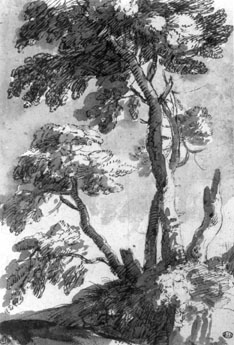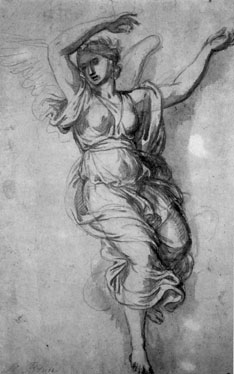|
Art
Times Homepage
Read
more Art reviews
17th Century
French Drawings at The Frick Collection
By RAYMOND J.
STEINER
November, 2002
 "Study
of Tress" bylaude Gellee (Lorraine) "Study
of Tress" bylaude Gellee (Lorraine)
|
IT IS COMFORTING
to know that, in a city that persistently espouses the blockbuster and
the outré, one still has The Frick Collection around to
offer a welcome balance. Once again they have mounted a scholarly exhibit*
of old master drawings, this time some 70 French examples selected from
the over 15,000 in the permanent collection of the Ecole des Beaux-Arts.
The Frick Collection has long been sensitive to the need for such drawing
exhibits, lending its walls to the showing of them when many museums have
long given into the practice of ignoring their relevance for the modern
artworld. Thanks to them — and to the Robert Lehman Foundation who
underwrote the show — "Poussin, Claude, and Their World" will have
its only North American venue in New York City, visitors able to view
these treasures until its closing in December. Some 34 artists —
among them, Jean Boucher, Simon Vouet, Charles-Alphonse Dufresnoy, Eustache
Le Sueur, Charles Le Brun, and, as the title notes, Nicolas Poussin and
Claude Lorraine — are represented, with works in pencil, pen, chalk,
graphite, India ink, various washes, and watercolor. There is also a wide
selection of genres, studies and preparatory sketches including ornamental
and decorative designs along with allegorical, landscape, portrait, and
religious subjects. Restricted as they are to works executed during the
17th Century, the exhibit serves as a mini-course outlining
the typical fare expected of a student attending the Royal Academy of
Painting and Sculpture during that period. Though often originally intended
as studies and "academics" for the artist who created them, that they
are part of the collection of a school — not a museum — reveals
their secondary (and, perhaps, more useful) use as visual aids for the
art student. Thus, for example, from such masters as Simon Vouet ("Portrait
of a Young Man, Half-Length, Wearing a Cape" — Black chalk with Stump
on Paper), Michel Corneille the Elder (Draped Standing
|

"Winged
Female Figure with Raised Arms"
by Charles Le Brun
|
Female Figure, in
Profile to the Right" — Black and White Chalk on Paper), Claude Lorraine
("Coast Scene with Aeneas Hunting" — Pen and Brown Ink, Brown Wash
on Paper), and Laurent de La Hyre ("The Stoning of Saint Stephen" —
Black Chalk and India Ink Wash on Paper), the apprentice might learn —
respectively — to limn the human visage, approximate the folds of
drapery, draw landscape and pastoral scenes, or the placement of large
groupings of figures in a confined space. That such masters of draftsmanship
were the common models used by former art schools tells us much about
how far we have strayed from such discipline. For the modern-day student,
the old academic lessons of heeding detail, of learning hand-eye coordination,
of understanding composition and/or the techniques of linear and wash
drawing might prove enlightening. In any event, however these drawings
might be viewed by modern standards, for the drawing aficionado, "Poussin,
Claude, and Their World" is a delightful feast. For those whose trips
to New York City are less frequent, holding off your visit until the end
of October will yield a double treat since at that time a selection of
paintings from the Toledo Museum of Art** will be concurrently shown.
If, on the other hand, you are susceptible to visual overload (as am I),
you might do better to take these shows in one at a time — I can
assure you that there is much to digest in viewing the present show alone.
*"Poussin, Claude,
and Their World: Seventeenth-Century French Drawings from the Ecole des
Beaux-Arts," Paris (thru Dec 1):
** "Masterpieces of European Painting from the Toledo Museum of Art" (Oct
29—Jan 5): The Frick Collection, 1 East 70th St., NYC
(212) 288-0700
Art
Times Homepage
Read
more Art reviews
|

